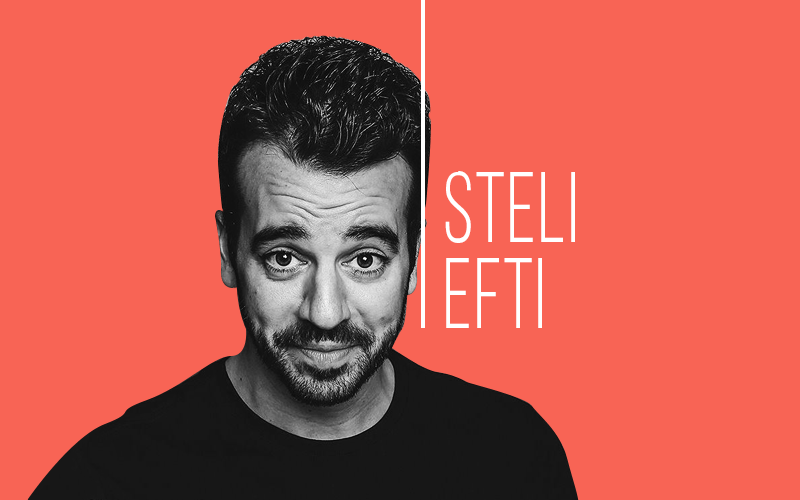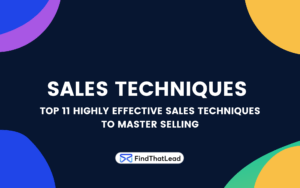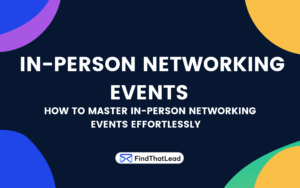Do you wish to get more of the loyal customers for your online business?
Here is an excellent interview with one of my favorite salespersons – Steli Efti from close.io. He has written many books on sales and is one of the renowned outbound sales experts.
Gerard: Very happy to welcome here, super rockstar Steli Efti from Close.io. Happy to have you here!
Steli: Thank you for inviting me.
To be honest with you I arrived yesterday night to New York from Germany. I woke up this morning, and I had so much pain in the throat. I felt terrible.
I looked at the calendar and tried to figure out the things I could move around and stuff I can’t. I looked at this event, and I said I could not move this around. Well now, I am relying on your high energy to make me feel better. That is very selfish of me but I am going to have this chat with you, and I am pretty sure it’s going to be like medicine to my body and soul.
Gerard: I remember when I started new in SAAS I didn’t know what to do. I heard a lot about you like, “Check this guy he is full of energy, and they told me to look more in deeper into your journey. You have inspired not only me but also many others from Spain and Greece.
You’re such a fighter to go to the US and fight against the CRM companies there, tell me, what was going through your mind and please share with everyone how did you do it?
Steli: Much ignorance and a ton of arrogance. You take those two things together and get a pretty potent mixture. I grew up in Germany but in an immigrant factory-working family. My single mom raised three boys on her own including myself. I hated school.
By the time I was 17/18, I had decided to drop out and start my first business. I got lucky. Many times the first time people try something, but you know fortune favors the bold.
The first thing I did work out pretty well. I had confidence, so I started a few other businesses and those worked out well. So I thought that I was pretty amazing and here I was 24 years old and I had an idea for a tech company. I have no background in technology, and I knew nobody who knew anything about tech or software. Tons of money made and other small business.
I was like – fuck it! I would buy a one-way ticket, I am going to fly over there, and I am going to start a great adventure. My internal plan for this thing was like “give me one or two years and I would have changed the world and would be Steve Jobs’ “best friend.” “
I don’t want to ruin the surprise or suspense, but it didn’t quite work out that way.
The reason, I went was I was young, had nothing to lose, I tasted much success, and I thought I could change the world. I was like fuck it, let’s make it happen. Naturally, things didn’t turn out to be as easy as I anticipated them to be and I wasn’t as good as I thought I was. So I had to clash my ideas with my vision, and goals/dreams had to disagree with reality.
I had to go through some painful times before I could learn my lesson but that’s how I got to move to the US, and that was exactly 12 years ago in April 2006. So this is a long time ago. Time flies, and here I am speaking with a fellow European(Gerard).
Gerard: You have your family in the US and are established there. Any plans to come back to Europe?
Steli: I have a lot of “family” in Europe. I spend much time every year in Europe. I would say about 4 months of the year I am traveling in Europe and I spend much time with family. I don’t feel I entirely left Europe.
I am in this weird spot in my life where I now realize I have come to peace with the fact that I don’t wholly feel at home anywhere, but I feel at home at certain degrees. So part of me is very American. I love the US, and I love living here.
Part of me is very greek, and I yearn the greek culture, and I love that part of it. Part of me is very german. It’s a pretty wild mix.
Every time I am there, I feel partly home. I love being there, but there is no place I can say I will leave this place and this is going to be home forever. Right now I love living in the US. I am sure it would be different if I did not travel as much but because I travel so much, I don’t miss Europe profoundly.
I feel I am part European and American. My children feel the same thing. They spend a ton amount of time with different family members and vacation with grandparents and all of that, so they are not disconnecting with what’s happening in Europe.
how do you deal with the NOs
Gerard: Tell me how do you deal with the NOs, how do you hustle and how do you keep your team members hustling?
Steli: First of all, disclaimer because I think many people that know me from my content or even worse when they know me on stage, they assume that I am walking into every room, kicking in the door, screaming at people. They think like I am a 24/7 worker and me I am not. I am not playing or acting. It’s just that it is not the only part of my personality. I am not always working.
For me, I had to cultivate a habit of dealing with rejection. I enjoy interacting with people, I enjoy connecting with people, I enjoy communication and convincing people and leading things or individuals to accomplish a specific goal. Those things come naturally to me, but I never enjoy being rejected.
Some people have something missing. They are so uniquely unaware and don’t care emotionally about how people react to them. They have a goal, and they go for it, and they don’t care even if people think they are stupid. I was never that person.
So I just had to realize that to accomplish the things I wanted to accomplish, I would have to learn to suck it up and deal with rejection. I just had to figure out in the beginning and over time was retraining my brain to react differently to when people reject me.
I would give you a simple example and a standard tip.
When I started doing cold calls, I realized that if I focused on success, if I told myself that all I want to do is book 4 appointments every day and if I focus on that stuff I realized that sales are not static. It fluctuates. There is an average, but you don’t get the same results every single day.
Things are different on a day to day basis. So sometimes I recognize I would have a good day, and the first 5 calls I made were all fire, and I scheduled 5 calls much faster than I thought. When did that, since I accomplished my goal I would be like I already got my goal achieved, time to go home and relax today.
I accomplished my goal, but then the next day I would have a below average day, and here I am making 100 calls to make my 5 appointments, and I still have zero appointments.
So really quickly after a short time in sales, I realize if I focus on the outcome I am going to stop when things are going well, and I am going to be in trouble when things are going poorly. So I turned it around, and I did something that was very basic which was a focus on the input versus the output. So I thought if I make on average 100 calls I should be able to schedule 5 appointments.
All I am going to focus on every day is to make 100 calls. That’s success. Some days I may schedule 2 demos, some days I may schedule 0, some days I might schedule 15. It doesn’t matter. I am just going to focus on rewarding myself or measuring progress regarding my input.
So I would start every day, and I would do it old school. I will take a piece of paper, and I would draw 100 little boxes on that piece of paper. Every dollar I would make I would check off one box. It didn’t matter if that call went well or not, if somebody picked up or not, I would see progress. Every call was a little more progress towards my goals.
The growth hacker mindset
I push this idea further. At some point, I was not just focused on doubts. I also focused on rejection.
I took a big bottle, I went to the bank, and I got a shit ton of pennies, and everytime someone told me no, rejected me or hung up I would throw money in the bottle. My mindset was when this bottle fills up I am going to be rich.
No matter what happens, if I am going to get more rejection than other people it means that by default I am going to have more success as well. It was impossible for everybody to reject me. I was talented enough to not be in a situation where every single person said no to me.
All I had to was see rejection as progress, to see action and activity as progress and focus on the things that I was able to control and that helped me to be consistent versus focusing on the outcomes that were mostly out of my control on day by day basis.
Not over an extended period. If you take an average of a month or a quarter, but in the day to day of the highs and lows of sales, I could not let the results Tunku life or turn how I felt. I had to turn it around and focus on my activities, and my actions instead of the results in that shot of a timeline and that made a big difference.
The other thing is it’s like a contact sport. The more you get hit, the more resistance you get, the less of a significance it has to be hit once in a while, the better you are at your defenses and eventually you can go into full contact sport without crying all day long over your bruises and all of that.
So over a lifetime of making sales and being rejected and dealing with rejection today, it is harder to phase me, but it doesn’t mean I like it. I still don’t like it. It still feels shitty inside. I just learned that it is part of the game over a long period of time of coming in contact with it I have been able to deal with a lot more rejection than the average person.
Are you doing cold calling or do you go for the big accounts?
Gerard: I hope everyone is taking note of that. Are you doing marketing? Are you doing cold calling or do you go for the big accounts? Are you raising money? Are you selling?
Steli: For those who don’t know, close.io is an inside sales CRM that we build specifically for small and medium-sized business for startups, any team that sells through the phone or email, sells through a virtual demo, so you don’t go out and knock on doors, you don’t have a field sales force.
Any small or medium-sized team that does selling through the phone and email and cares deeply about sales productivity, more so that reporting, more so that security, what you want is your salespeople and yourself to crush it, to close more deals to make more revenue.
We make the best CRM in the world for you. We have thousands of customers all around the world. We are highly profitable for the past 4 years and growing. So right now we are not planning on raising any outside money which is exactly the position you are in when everybody wants to give you money.; When you need the money nobody wants to give it to you.
Not a single week goes, investors try to pitch me to get money from them. That’s it concerning the business.
We don’t do any cold calls or outbound sales; it’s all inbound. My primary job at Close.IO, the two things I am responsible for is, that I represent the brand and the person behind the brand, so I do much public speaking, I do much writing. I am involved a lot with the marketing side and the promotional side of things of creating a lot of energy and love from our customers for the brand.
The other part of it is I spend a lot of time with hiring and recruiting and with coaching and helping and serving the people that work in my company. 20% of my time is probably marketing related, 20% is random shit, then 60% is hiring, recruiting, coaching, leading and managing the people in the company.
Gerard: Most of the people in the group I would say own medium-sized companies. They are like some agencies and growth hackers. What do you recommend to start with to get the first thousand users, tell me a few points on that and then how you go to the next level?
Steli: The first ten customers, hundredth and thousand. Those are the figures I think are real milestones and where you probably have to switch up things. I think for the first ten customers, you have to do whatever it takes.
“There is no real hacks here, no real shortcuts, Nothing here will ever be elegant and beautiful. It’s going to be messy and awkward and not ideal; My best advice is to look at the simplest places to go. So first you always want to look for friends, family connections, people you know and have a relationship with.”
Try to approach them in the early days. A good hack I can throw out there is the first ten customers I would not even contact them as pitching them direct them to purchase my service. I would approach them or give advice.
You ask for money they provide you with advice, and they might give you money.
When you are very early, and you haven’t developed things, especially if you’re not selling to an audience that you already know and cultivated, you are already very knowledgeable about, a great way to go about it is to ping people that could be your potential buyers and tell them we are building brand new technology , we are innovating in your space. You are an expert, you have a long career in this field.
“We want to ask for 10 – 15 minutes of your time to show you our new technology or tell you what we are building and get your expert advice”. You will be surprised to see how many people like to give expert advice. Everyone likes to be an expert, and everyone likes to give advice. So when you approach people that way they don’t have the guard up where they are like they want to sell me something I don’t want to buy.
They think this is a new innovative startup and they want advice. I am going to be a startup advisor here. That’s much sexier. That is also the truth. If you approach it the right way you do want to ask questions and you do want to listen, and you want their advice.
The way you potentially get their money’s by starting with that. You tell them a little bit about what they do, and then you ask them questions about how they think about the problem and what solutions are out there and what they have seen work or not work and what their concerns would be if they were an advisor to your startup, how they would sell this.
I would flat out ask them if you were my co-founder how would you get your first ten customers, who would you email, how would you punch them, what would be the messaging, what is the pricing. These people are experts.
Your potential future buyers are nobody who knows how to build your product and how to market and sell it.
Something beautiful would happen. Sometimes you are going to be very critical, and they would tell you I don’t think this is a real problem or I don’t think you could sell this or for whatever reason, they are not going to think it’s a good idea or something that has real merit.
In those cases, there is no real way to sell to them, and it would have been wasted efforts anyways. Maybe down the line, you might be able to sell it, but right now you won’t be able to sell them. Right now take that critical feedback and keep them in the loop as you progress with your business and company.
Keep sending them updates and letting them know how things will work out. As you see more success maybe three, six, nine, twelve months down the line.
Now the time is right and their cynicism about how early you are and how small and how unthoughtful your solution is might go away over time. There is going to be some people that are going to be enthusiastic hopefully.
They are going to tell you what you are doing is fantastic. in those cases, you can easily at the end of the conversation go well since you think this is so awesome how about you become the customer.
Just ask the question what would it take for you to become a customer and let them enlighten you. Some of these relationships should be able to turn into a customer. So you go to your friends, you go to your family, you got to potential buyers asking them for advice, versus asking them directly to give you all their money and depending on what you do for some businesses.
I am speaking to you from a b2b framework. I am not speaking from an end consumer framework which I know nothing about.
Gerard: It is usually what we have in the group which is b2b growth hacking.
Steli: That’s what you do to get your first ten customers and then the most crucial piece of advice I have to give is once you hit the first ten or two customer range you need to start paying much attention to who is your most successful customer, and this is what most companies get wrong.
They get to 30 customers; they push to get to 100, they struggle to get to 1000, never slowing down, never stopping to assess out of all these customers who are the best customer that we have and best measured by success and not by happiness.
A happy customer is just someone that emotionally is just as happy.
That is cool, we all like that, but success is what truly matters and success is measured by how much more value than they get versus what they are paying you and how or are they aware of that. They need to have both. They need to be getting a lot more value from you than what they are paying you, and they need to know it.
They need to be acutely aware of it. If you have the potential and the foundation to build a vast business and scale but, most startup won’t get to 100 customers, they would die before but for the people that we are talking to here, the hustlers, the growth hackers, they might get to 10 or 100.
They have figured out the basics of how to get something on the road, but if you don’t analyze your customers, the niche that gets the most success, you might fuck yourself down the line.
You are getting more and more customers and all of a sudden they start chaining higher numbers because it is much harder when you have 1000 customers, 30 employees, 1 million raised. It’s a much harder vehicle to pivot than when you are in the beginning with just 20 customers and 3 people, and you are bootstrapping and experimenting.
I had a call a few weeks ago with a European startup, raise a serious capital. Three founders on my phone, they want to ask me for advice on how to go after different verticals, and at some point, I am like hey guys how many customers do you have. They have like 100 customers. I am like out of your 100 customers who are your most successful customers?
Silence.
At some point one of the founders go I don’t know about you guys but I don’t have any idea, and the other two were like we don’t know. I was like that’s why you want to look for new verticals because you are probably seeing a problem of explaining.
You have customers where every customer can pay you millions of dollars. Now they are only paying you 10k per year. Why are you looking for new verticals?
It’s because there are fundamental issues and they want to run away from them versus face them which I get. We all have made that mistake. So my advice especially to growth hackers and hustlers and can get to the first customers is that eventually once you have seen some proof and the first 10-100 customers you want to go abroad.
You want to try different things and accept different things. you get whatever you can, and it also gives you more data and more experience, but you have to slow them down and narrow in on who are you most.
I was in a moment where we had downtime and instead of just calling to apologize, we called, we fixed, and then we used it as a business opportunity since we are already engaging with the customer to deepen the relationship. I know that many people will find this crazy.
The reason I am sharing this is not to brag; there is nothing to brag here. The reason I am sharing this is to give you a different perspective.
When things are difficult instead of running, you need to show up because everybody else is running. So if you stand there and you are approachable, and you are reachable for your customers, you are going to make an impression, you are going to stand out. The same thing is with product demos. I always tell people when things go wrong in a product demo I love it.
It’s the best thing ever because 99% of people who get your product demos, and there is a big or error, they are all flustered. How about using it as an opportunity to stand out. If I create something and there is a bug or error message, I would tell the customer during that live demo; this is perfect. This is an actual bug. I did not plant this, I did not expect this, but this gives us an excellent opportunity to show you how we do support. So whenever you run into any issue here is what I want you to do. You go up to the right and click on the support chat.
I show people how to get help, I teach them how to ask for good support because many don’t know how to ask for proper support and I am making myself stand out in a moment where there is a crisis. Instead of me feeling weird about it I feel normal so the audience will think its normal.
Your emotions translate over to the prospect. When things go wrong its a real opportunity to stand out and to deepen the relationship with your customers, and most companies will never use those opportunities.
Gerard: I love the fact that you take a problem and you make it an advantage. You are super flexible. I love your energy. We are the sales guys, and we are hustling, but we can also see you are also analytical. When did you change?
Steli: I don’t know if I would use the word super analytical. I think mindful or thoughtful would be more the word that I would use if I had to describe the things that have changed for me. I guess when you are super young, it was easier for me to waste my time or be very free with my time because I had so much of it.
I could devote all my energy and my time to my work. I think over my career. I realized how much of my time I was wasting on things that didn’t matter or didn’t create impact and the constraints of my time started increasing. I was getting older, the family and children, more significant business, more customers, more employees, more public figure, hundreds and hundreds of people every day sending you emails, asking you for help and advice, as the demand of my time goes up it is a more precious resource.
So I have to be more mindful of how I use my time and how I look at things. I think it was a gradual process of just becoming more thoughtful about my time and my prospects and customer time.
This is how I judge sales people or people in general. If someone sends me an email and the email is 20 pages long, I know this person is not mindful of their time so they are not mindful of my time either and I cannot have that. I will not engage in a relationship with someone like that. Versus if I have someone who shows me, they are valuing my time and their time those are the people I want to engage with because I know 99 out of 100 times those people are people who create much success for themselves and others.
So I think I have just gotten a lot more mindful and thoughtful.
Instead of back in the day, every problem I approach for me there is a wall and three in my head, what is going to be harder-the wall or my head? I was young and healthy I was able to break through some of these walls with pure force.
As I am getting older, and my headache started increasing, and my body didn’t like recover as quickly I started thinking I know I am a hard-headed person but maybe before I start running against this wall, perhaps I would use my eyes to see if there is a door anywhere. I will take the time to find the door and walk through the wall versus having to crush it.
Things have gotten easier. For me it just took time, and it also took the age where my time is more restricted. It made me realize I want to be mindful of how I spend my time and how I invest it and how I do that with my customers.
I Don’t do 60-minute customer calls; I don’t do one-hour lunch meetings, I do 15-minute calls. It doesn’t matter if you are a multi-million dollar customer if you are somebody famous. I figure out that what I was able to do in 60 minutes, I am not able to do in 1 to 5 minutes.
Heath and I have a podcast called the Startup Check, and he taught me that in many cases even 15-minute call is too much. The question in the email you can answer in 2 minutes or 3 minutes every having to talk to them for 15 minutes on the phone.
Today I have built up a vast library of content, often when people want to jump on a call with me, I push back and ask their questions and challenges.
9 out of 10 times I have a 3 videos a podcast and a blog post, and I watch all this, consume all this and then come back to me with a question. Most of the times though those pieces of content addressed most of the issue people have.
So I think mindfulness and thoughtfulness is the thing that grew in my life. I am more critical and more strategic than I used to be but I’m not the most analytical person in the world. I will admit that.
Gerard: To finish and wrap up, who is your king?
Steli: There are many people I admire. Many people have to do nothing with a business that I admire their thought and the way they live their life. In terms of business to me, one of the most inspiring founders is Jeff Bezos.
Jeff is nothing like me, and I am nothing like him. I am never going to be anywhere in the way he has built his empire. I am not trying to be him. There is one thing that impresses me about him. It’s not the money. I am not anywhere near his IQ but the on one thing I admire that I think I have gotten better at and I am building on top of them, and he is one of the inspirations is long-term thinking.
One thing I admire about his is that Amazon was one of the first tech company. Amazon is still a player at the top, and one thing I admire is Jeff said early on said we are not going to look for what is changing.
We are not going to be looking around to adapt to change. We are going to ask ourselves what is never going to change. For Amazon it was people would never want to pay more money for the same product and people would never want to wait longer for the same product. So if we take these two things and we say we are going to use all innovation, all technology, all invention to get things cheaper and faster, we will be golden forever.
That deep thinking, thinking in decades versus in weeks and months is to be one of the things I observe that many people I admire have in common. They have different long-term thinking in the way that I have approached things. I have gotten much better at this, especially when it comes to a relationship.
I have started to think long term. I have a blog post about how I recruited someone and was calling someone every month for 4 years.
Gerard: It was my dream to have you on the show, and now you are here. I want to say to everyone be thinking about how you approach the people and I think the worst way to approach
Steli is via email because it just doesn’t work. I think you should have to approach whomever you want to approach with love and you have to do something and that time is worth your time. You are such an inspiration.
Steli: Thank you for inviting me. It was a pleasure to get to know you as well. When I watch some of your videos, the word love was used way above the average.
The way you use love comes through in a way that stands out. I was like this seems to be a person that I want to connect with and build a relationship with. When it comes to me if people want to reach out and get in touch with me send me an email with this subject line” Bundle Motherfucker” and I am going to send you back a link that has all my books as a bundle for free for you.
Successful customers because then you want to double down and triple down and getting more of those and you want to figure out who are your worst customers, and you want to figure out how to stop getting more of these customers. You don’t do marketing, sales, you don’t do anything about acquiring bad customers.
They are like toxic waste that seems reasonable on the surface it’s going to destroy your business. Sometimes when a customer comes to us, we would say no to a customer that would pay 20k per month, but we know the way the organization is structured, the way the support and service needs are structured we know we would only make a small margin of profit.
Much smaller than getting three small customers each paying us 4k. So we say no to profitable revenue because it doesn’t make practical sense.
You want to make sure that you pay attention to who are the worst customers or best customers, and you stop doing the things that get you, bad customers. You double down on the things that get you, successful customers because then scaling to 1000; it doesn’t matter if that is going to be slow or fast because you are growing with such quality that it compounds.
If You have 1000 successful customers, 1000 customers are where they get a lot more ROI from your solution than they are paying all realize I guarantee that you are going to be a 100 million ROI business. You are going to get there, maybe in 5 years, maybe in 7.
Having 1000 highly successful customers is hard to do. It doesn’t matter how quickly you get there if you get the right type of customers. I find that growth has a quality that starts compounding things more comfortable.
It’s like rolling down a hill versus what I see in many cases, especially in silicon valley, we have money to throw away and get to revenue numbers and get to things up.
To the right no matter if it is good quality or not, where you may make things look good and go up into the right for a year or two, but then you are just setting up yourself for all the trouble eventually you are going to have to face reality and then what do you do.
What do you do when you have full board members, and 20 million raised and 100 employees, and you don’t know who your successful customers are, and you are searching customers left and right. You are fucked at that moment.
That’s the most significant piece of advice. It’s not just how do you get there but what are the critical things to pay attention to.







 BONUS:
BONUS: The Challenge: Join this free course and I guarantee that after 5 days you will have the necessary skills to start generating B2B clients Growth Hacking and Prospecting techniques.
The Challenge: Join this free course and I guarantee that after 5 days you will have the necessary skills to start generating B2B clients Growth Hacking and Prospecting techniques.